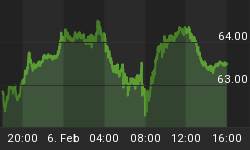The following article is excerpted from a brand-new eBook on gold and silver published by Robert Prechter, founder and CEO of the technical analysis and research firm Elliott Wave International. For the rest of this fascinating 40-page eBook, download it for free here.
Have you ever traveled abroad and taken a look at the local currency and wondered how the citizens of that country could take seriously what looks like "Monopoly money?" I've got news for you: You're using the same stuff. Monopoly money is the money over which some government has a monopoly. It is the currency of the realm only because the state makes it illegal to use any other type.
Promissory notes issued by a state and declared the only legal tender are always doomed to depreciate to worthlessness because of the natural incentives and forces associated with governments. A state cannot resist a method of confiscating assets, particularly one that is hidden from the view of most voters and subjects. By extension, it is unreasonable to advocate a standard for such notes, which is simply a state's promise that its currency will always be redeemable in a specific amount of something valuable, such as gold. A gold standard of this type is only as good as the political promises behind it, reducing its value to no more than that of paper. It could be argued, in fact, that a state-sponsored gold standard is far more dangerous than none at all, as it imbues citizens with a false sense of security. Their long range plans are thus built upon an unreliable promise that the monetary measuring unit will remain stable. Later, when the government's "IOU-something specific" becomes, as Colonel E.C. Harwood put it, "IOU nothing in particular," reliability disappears and the arbitrary reigns. Although the populace tends to retain its confidence in the currency for awhile thereafter, the ultimate result is chaos.
The only sound monetary system is a voluntary one. The free market always chooses the best possible form, or forms, of money. To date, the market's choice throughout the centuries, wherever a free market for money has existed, has been and remains precious metal and currency redeemable in precious metal. This preference will undoubtedly remain until a better form of money is discovered and chosen. Until then, prices for goods and services should be denominated not in state fictions such as dollars or yen or francs, but in specific weights of today's preferred monetary metal, i.e., in grams of gold. Anyone might issue promissory notes as currency, but the acceptance of such paper certificates would then be an individual decision, and risks of loss through imprudence or dishonesty would be borne by only a few individuals by their own conscious choice after considering the risks. Critical to the understanding of the wisdom of such a system is the knowledge that private issuers of paper against gold have every long run incentive to provide a sound product, just as do producers of any product. As a result, risks would be minimal, as the market would provide its own policing. Thievery and imprudence will not disappear among men, but at least such tendencies in a free market for money would not have the potential to be institutionalized, as they are when a state controls the currency. From a macroeconomic viewpoint, occasional losses resulting from dishonesty or imprudence would be extremely limited in scope, as opposed to the nationwide disasters that state controlled paper money has facilitated throughout history, which have in turn had global repercussions. As Elliott Wave Principle put it, "That paper is no substitute for gold as a store of value is probably another of nature's laws."
That being said, it is also true, and crucial to wise investing, that markets come in both "bull" and "bear" types. Being a "gold bug" at the wrong time can be very costly in currency terms. For nearly three decades, gold and silver's dollar price trends have confounded the precious metals enthusiasts, who for the entire period have argued that soaring gold and silver prices were "just around the corner" because the Fed's policies "guarantee runaway inflation." Yet today, 29 years after the January 1980 peaks in these metals and despite consistent inflation throughout this time, their combined dollar value (weighting each metal equally) is still 40 percent less than it was then.
It is all well and good to despise fiat money, but it is hardly useful to sit in gold and silver as if no other opportunities exist. In contrast to the one-note approach, which has had an immense opportunity cost since 1980, competent market analysis can help you make many timely and profitable financial decisions in all markets, including gold and silver.
For more in-depth, historical analysis and long-term forecasts for precious metals, download Prechter's FREE 40-page eBook on Gold and Silver.















